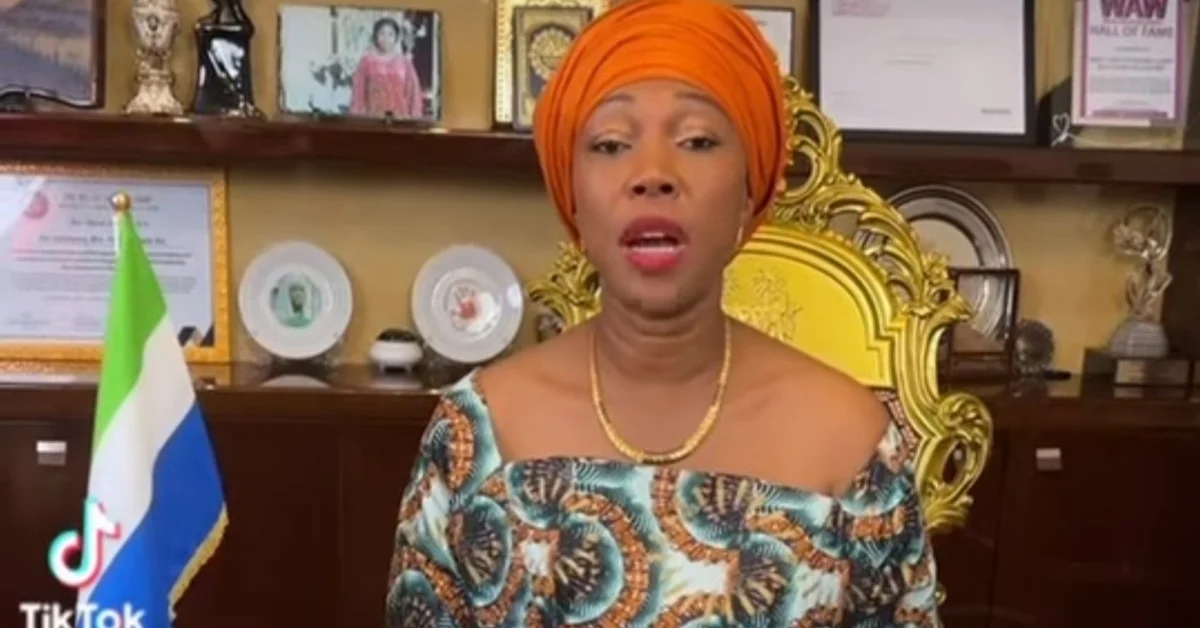Sierra Leone’s First Lady Fatima Bio has vowed to contribute to the fight against human trafficking and other sexual-related crimes in the country, noting that perpetrators will be brought to book
In her statement a few days ago, the first lady noted that human trafficking is a crime and together a stop can be put to it in the country.
“Human trafficking is a sinister crime, the majority of our victims are women and children who suffered brutal violence, forced labour, horrific sexual exploitation and other abuses in the hands of traffickers,” she maintained.
Sierra Leone’s First Lady Fatima Bio also noted that a child who is engaged in commercial sex is a victim of human trafficking under the anti-human trafficking and migrant smuggling act of 2022.
In August, this year, Madam Melrose Karminty, the Minister of Social Welfare, spearheads the launch of Sierra Leone’s National Strategy to End Human Trafficking.
The Minister, During her keynote speech at the United Nations Network on Migration’s “Working Better Together” program addresses the critical issue of human trafficking. She underlined the importance of collective action to combat human trafficking in all its forms.
The Minister underlined the gravity of the crime and the need to leave no victim behind, ensuring that victims receive comprehensive and tailored support. She highlighted the importance of the National Referral Mechanism, which provides a pathway for victims to access quality protection services, including temporary shelter, rehabilitation, reintegration, and economic empowerment.
Dehunge Shiaka, The Executive Director of the Anti-Trafficking in Persons Agency, commended the partnership with the Ministry of Social Welfare, noting that the collaboration aimed to implement the Anti-Human Trafficking and Migration Smuggling Act No. 12 of 2022. He said “This significant step involved strengthening the Anti Trafficking in Person Task Force secretariat for effective coordination, monitoring, and supervision of state and non-state actors working towards combating trafficking.”
Human trafficking is a serious issue in Sierra Leone. According to the United States Department of State, Sierra Leone is a source, transit, and destination country for children and women trafficked for the purposes of forced labor and commercial sexual exploitation. Trafficking within the country is more prevalent than transnational trafficking and the majority of victims are children
According to a recent report by the University of Liverpool and the University of Georgia, an estimated 33% of children aged 5 to 17 in Sierra Leone’s Eastern Province have experienced child trafficking, and 36% have experienced child labor. The report represents the largest-scale household survey on the topic ever undertaken in Sierra Leone . The report specifically describes child trafficking and child labor in three hotspot districts in the Eastern Province—Kono, Kenema, and Kailahun—that are among the poorest areas in what is considered one of the world’s poorest countries .
The United States Department of State reports that Sierra Leone is a source, transit, and destination country for children and women trafficked for the purposes of forced labor and commercial sexual exploitation. Trafficking within the country is more prevalent than transnational trafficking and the majority of victims are children. Within the country, women and children are trafficked from rural provinces to towns and mining areas for domestic servitude, sexual exploitation, and forced labor in diamond mines, petty trading, petty crime, and for forced begging. Women and children may also be trafficked for forced labor in agriculture and the fishing industry. Transnationally, Sierra Leonean women and children are trafficked to other West African countries, notably Guinea, Côte d’Ivoire, Liberia, Nigeria, Guinea-Bissau, and The Gambia for the same purposes listed above and to North Africa, the Middle East, and Western Europe for domestic servitude and sexual exploitation.
The government of Sierra Leone has made efforts to combat human trafficking, including increasing investigations and prosecutions, allocating funding to an NGO for protective services, and adopting a new anti-trafficking national action plan. However, the government still needs to expand victim shelter and services, including for male victims, outside of Freetown, and train officials on the standard victim identification measures and national referral mechanism to ensure trafficking victims receive timely services.








